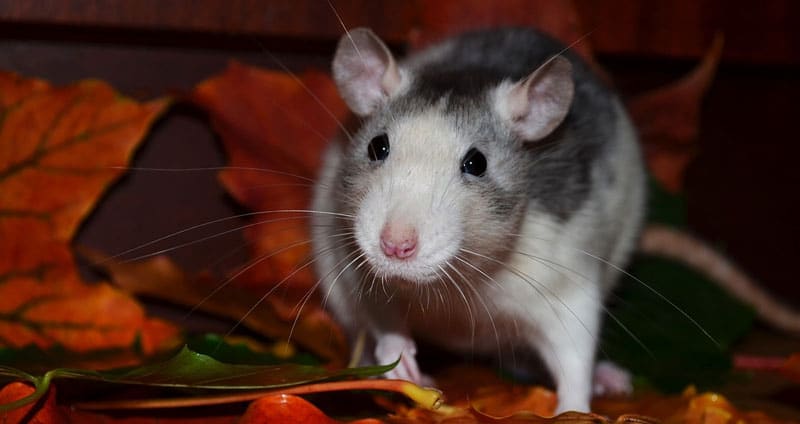No matter what pet you own, you’ve likely noticed that they have much different sleep schedules than humans. While most humans sleep all night and stay up all day, most animals tend to sleep sporadically throughout the day!
Rats are no different in this respect.
However, rats have unique sleep schedules due to their personalities and the way in which they hunt.
So, are rats nocturnal, or are they something else altogether?
Table of Contents
Are Rats Nocturnal?
Rats are primarily nocturnal creatures, spending most of the night awake socializing, foraging, playing, cleaning, and building.
This nocturnal behavior has existed for millions of years, ever since rats’ ancestors would come out at night when the bulk of their main predators were asleep.
While pet rats don’t have this looming threat in their lives, their nocturnal sleep pattern persists. However, they seem to quickly adapt to this and take on a sleep schedule that correlates with their owner’s.
How Sleep Schedules Differ Between Pet & Wild Rats
It’s important to note that rats are very social creatures and form close bonds with their owners quickly. This pension for personal connection takes a lot of people by surprise in quite a pleasant way.
Your rat will want to spend as much time with you as possible, so it will adjust its sleep schedule accordingly. Therefore, if you tend to be around during the day, they’ll spend some of that time awake so that they can interact with you.
Wild rats, on the other hand, are essentially only interacting with other rats. Since rats are primarily nocturnal, social interaction isn’t a reason to deviate from this sleep schedule.
So, it’s generally less common to see a wild rat out and about during the day, but it can definitely still happen.
What Do Rats Do At Night?
Nocturnal animals do basically everything that animals with standard sleep schedules do, just at night.
Rats are foraging creatures, meaning that they spend a good portion of their time awake running around and looking for food. Wild rats have a much more involved scavenging process, but pet rats exhibit the same behavior.
Because of this, it’s a good idea to spread food throughout your rat’s cage and in their bedding so that they can scavenge for it at night. Just be sure to clean up any uneaten food regularly!
In addition to scavenging, rats spend the nighttime cleaning and rearranging their nests, socializing and playing with other rats, and cleaning themselves.
While it may be disappointing that rats are mostly active at night, a lot of that time is spent doing standard rat tasks. They tend to save the fun playtime for their owners!
Standard Rat Day/Night Schedule
Rats spend, on average, 15 hours sleeping per day. This is quite a significant amount of time, so they don’t spend all 15 hours straight sleeping. Instead, they break it up into segments.
Every rat and their environment is different, so there isn’t a universal sleep schedule that’s 100% accurate to every rat. However, there are common trends that exist in the sleep schedule of a rat.
Morning
Typically the morning is where most rats are winding down their nighttime adventures and starting to settle in for a good amount of sleep. However, this isn’t always the case.
Domesticated pet rats tend to exhibit more of a crepuscular sleep schedule than a nocturnal one. What this means is that they’re more active during the early morning and early nighttime instead of only nighttime.
A large portion of this behavior can be chalked up to the fact that many owners are up, active, and home in the early morning, and rats know this.
They’ll be more than willing to stay up for a couple extra hours if it means that they get to interact with their owner.
Day
During the day, rats get in most of their sleep. The daytime is dangerous for wild rats and boring for pet rats (during weekdays, anyway), so they’ll use this time to rest up.
As stated earlier, though, they don’t sleep throughout the entire day. Rats will regularly wake up, clean themselves, rearrange their nests, eat a little, and go back to bed. Rinse and repeat many times over the day.
Evening
Evening behavior for rats is very similar to their morning behavior. While wild rats will likely still be sleeping during this time and just starting to wake up, pet rats will often wake up.
It’s around this time that many people get home from work or school and are willing to interact and play with their rats, so they’re all for waking up a bit earlier.
Rats will typically have more energy during this time, too, as they’ve likely been sleeping for most of the day.
Night
As stated, night is the time at which these nocturnal creatures wake up to carry out most of their daily tasks.
Wild rats will spend most of this time awake, while pet rats tend to spend a portion of it sleeping to make up for the time spent awake during the morning and evening.
Why Is My Rat Always Sleeping?
If you’re concerned that your rat always appears to be sleeping, don’t worry!
You need to remember that rats are naturally nocturnal and have millions of years of evolution behind this behavior. It’s in their biology to sleep for more than half the day, primarily during the daytime.
Rats will often tweak their sleep schedule so that they’re awake when you’re awake, but not all of them do this. Your rat may simply want to sleep during the day and be active while you’re sleeping.
Now, if you notice that you rat is sleeping for way more than the 15 hour average and not eating, cleaning, or doing anything a rat should, then you may want to take them to a vet.
Is It Bad To See Rats Out During The Day?
A common myth you’ll hear is that it’s a bad sign to see rats out and about during the day. Since rats are nocturnal, seeing rats running around your property in broad daylight is indicative of an infestation.
Fortunately, this is exactly that: a myth.
While rats are nocturnal, this is merely a general behavior. Rats can still be active during the day if they wish.
Sometimes, daytime behavior is actually optimal for rats if food sources are prominent and there’s a lack of predators.
A way to tell if you have a rat infestation is if you see a lot of rats at basically at times of day. A stray rat or two during the day means nothing beyond the fact that you have rats on or near your property.

